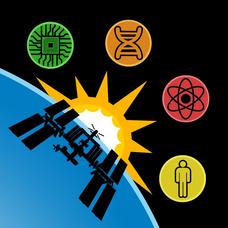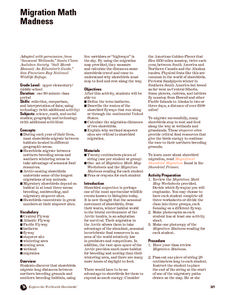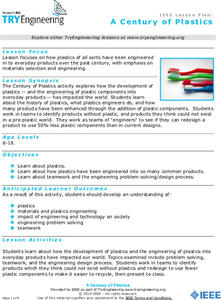Pearson
Performance-Based Assessment Practice Test (Grade 7 ELA/Literacy)
Give your class a taste of the Common Core with a practice test that includes both literary and informational reading passages. Pupils respond to related multiple choice questions and longer written response questions. See the materials...
NASA
Cleaning Water
Give young scientists a new appreciation of fresh, clean drinking water. After learning about the ways astronauts recycle their air and water, your class will work in small groups creating and testing their very own water filtration...
NASA
Space Station Research Explorer
Take a trip into outer space from the safety of your classroom. A great addition to the digital library of any science teacher, this reference offers a behind-the-scenes look at the research going at the International Space Station.
Kentucky School for the Deaf
Levels of Organization within an Ecosystem
From tiny organisms to entire biomes, young scientists examine the interdependent relationships tying all living and non-living things together with this collection of ecology resources.
Santiago Canyon College
Taking Notes for Science Class
Provide young scholars with the tools they need to succeed with this reference on the Cornell note-taking strategy. By breaking the content of lessons into main ideas, supporting details, and overall summaries, students are able to...
Speak Truth to Power
Jamie Nabozny: Bullying: Language, Literature and Life
Class members identify bullying in contemporary texts and role play how they might change those scenes to examples of anti-bullying. They then re-define their initial definitions of bullying and discuss what they would like to see as...
Institute of Electrical and Electronics Engineers
Shake it up with Seismographs!
Shake things up in your STEM or earth science classroom when you have small groups construct their own seismographs. A reading assignment on the history of seismographs, the Richter scale, and current technology sets the stage for the...
Institute of Electrical and Electronics Engineers
Failure: Seeds of Innovation
"If at first you don't succeed, try, try again!" Through this assignment, emerging engineers examine how failed experiments are simply part of the process of an outstanding design. They begin with some reading about the microwave oven,...
Institute of Electrical and Electronics Engineers
Chair Lift Challenge
During the Winter Olympics, this would be an engaging task to include in your STEM lesson. Design teams plan, construct, and test a miniature ski lift that can carry a pingpong ball up and down a rope line without falling out. With this...
Institute of Electrical and Electronics Engineers
Pendulum Time
Take your time with this lesson. Junior engineers read about different types of clocks and then work together to build a pendulum time-keeper. There are no hints as to how they might go about accomplishing this complex task, so you may...
Institute of Electrical and Electronics Engineers
Blast Off!
With the use of a model rocket kit, aspiring aerospace engineers work cooperatively to construct and launch a rocket. A preparatory reading assignment is included, covering Newton's laws of motion and information about the first...
Institute of Electrical and Electronics Engineers
Radio Reception and Transmission
After reading about radio transmission, application, and the difference between AM and FM, small teams of engineers use a kit to construct an FM radio and then send and receive broadcasts. This is an ideal activity for middle school STEM...
Institute of Electrical and Electronics Engineers
Arduino Blink Challenge
Emerging engineers read about Arduino software and how it can be used. Then they follow a nine-step tutorial to connect an Arduino board to a computer and put it to work! The objective is to code a program that will cause an LED to...
Institute of Electrical and Electronics Engineers
Stop and Go
It's "Green light, go!" with this lesson! STEM classes are illuminated with the history of traffic signals and how the engineering design has improved over time. They also learn about patents for new inventions. Finally, they research in...
Prince William Network
The Incredible Journey
Divide your school gym into breeding grounds and non-breeding grounds so that your zoologists can play a game simulating the seasonal migration of shorebirds. Players pick one of the included game cards and follow its directions, which...
Prince William Network
Migration Math Madness
A great way to incorporate math into life science, this lesson has learners measure migratory routes on a map and calculate the actual distance that shorebirds on the routes would cover. Learners compute the distance covered in both...
Institute of Electrical and Electronics Engineers
Engineered Music
Sound engineers investigate the structural design of a musical instrument, the recorder. They work in collaborative groups to choose an instrument to build out of everyday craft materials. It must be able to repeat a three-note sequence...
Institute of Electrical and Electronics Engineers
Life Vest Challenge
After reading about the history and science of personal floatation devices, patents, and intellectual property, engineering teams design a life vest for a can of soup. To evaluate which groups considered the need for waterproofing, hold...
Institute of Electrical and Electronics Engineers
Be a Scanning Probe Microscope
Extensive reading is done in order to learn about scanning probe microscopy and nanoscale. Afterward, individuals use a pencil to probe an unidentified object that is inside of a box so that they cannot see it. Using only what they could...
Institute of Electrical and Electronics Engineers
Tennis Anyone?
After reading up on the history of sports racquets, engineering teams design and construct a racquet for batting a Velcro-striped ball at a target. Teams evaluate their design by aiming for the target three times each and answering...
Institute of Electrical and Electronics Engineers
Keep it Cool
This cool lesson plan is ideal for elementary engineers or physical scientists, especially when learning about heat transfer and insulation. After reading a page of background information, engineering teams collaborate to design and...
Institute of Electrical and Electronics Engineers
Making Sense of Sensors
Have small groups in your class construct working hygrometers as an example of the benefits of using sensors in engineering. This activity can be used during a weather unit when covering humidity or in a STEM activity as a preparation...
Institute of Electrical and Electronics Engineers
Adaptive Device Design
After reading about how engineering has made adaptive devices possible for people with disabilities, pupils work in groups to discuss different devices to determine whether or not they are adaptive. They also disassemble a pair of...
Institute of Electrical and Electronics Engineers
A Century of Plastics
After reading about polymer materials, engineer trainees examine how plastics have been integrated into everyday products. In groups, they compile a list of products made entirely without plastics and then, as a closing activity, try to...













